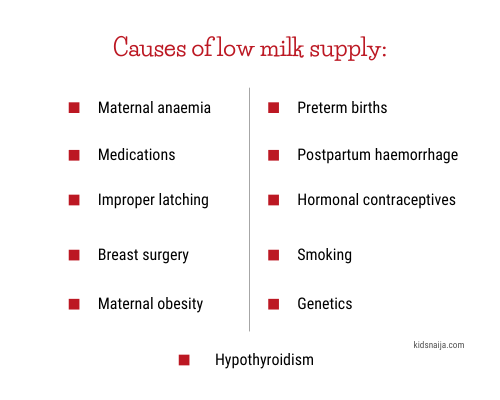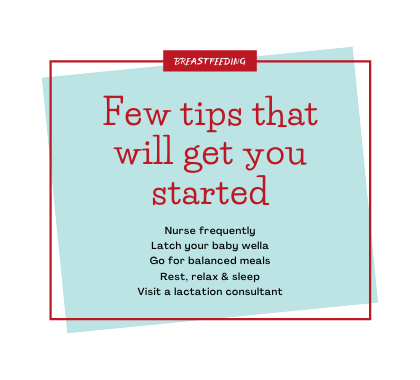It is common for nursing mothers to complain about their babies not getting enough milk. Although most of these are more perceived than actual, low milk supply is still an issue for some mothers.
It is one of the main reasons nursing mothers abandon breast milk and adopt formula feeding. There are other reasons why mothers go for formula feeding as well.
The immense benefits of breast milk cannot be overemphasized. WHO and other concerned bodies, strongly recommend exclusive breastfeeding for the first six months of your baby’s life and even up to 2 years after birth and beyond.
- A Few Notes About Breast Milk
- What Low Milk Supply Means
- What Are The Myths That Surround Low Milk Supply?
- I have small breast that is why my breast milk is lower
- I nurse frequently that is why my milk supply is less
- My breasts are soft: it does not contain enough breastmilk
- My baby feeds too often; it’s because my milk supply is low
- My breastmilk supply is low, that’s why my baby downed a bottle after breastfeeding
- What Causes Decreased Breastmilk Supply?
A Few Notes About Breast Milk
Human milk, especially the first milk that comes out of your breast is called colostrum. It contains substances that help fight against microbes/germs and also helps to reduce inflammations.
It offers protection against most childhood illnesses and death, while also ensuring optimal growth and development.
The useful compounds and microbes in colostrum prepare the baby’s gut against harmful invaders.
Breastfeeding is not only beneficial to babies alone, but it’s also helpful to mothers. It offers mothers a shield against certain cancers, type 2 diabetes, and heart diseases.
Breastfeeding your child helps you save cost, lose postpartum weight, and increase the bond between you and your child. Hence, more women are leaning towards the option of human milk feeding. But they get discouraged by the issue of low milk supply.
What Low Milk Supply Means
The supply of breast milk is said to be low when there’s low production of milk.
You might ask, “is it possible for a woman to be unable to produce breast milk?” The answer is yes.
That is why pregnant women and nursing mothers must pay attention to the food, medications, and activities they indulge. Why? Because these things could have a lasting effect on them and their baby.
For instance, in nursing mothers, these things might decrease their milk supply.
These “things” including alcohol and smoking, can influence the effect of prolactin, the milk hormone. And the hormone will find it tough to initiate the production of breast milk.
Hence, nursing mothers need proper orientation on how to boost the quality and quantity of their milk. But this isn’t always the situation, and when milk supply “refuses” to increase, then do consider formula feeding.
Before checking out the causes of low milk supply, let’s bust a few myths about the topic.
What Are The Myths That Surround Low Milk Supply?
I have small breast that is why my breast milk is lower
There’s nothing correct about this theory. Breast size does not determine the quantity of breast milk produced.
So the next time someone insinuates that your milk supply is low because your breasts are small, please do not hesitate to lecture the person.
I nurse frequently that is why my milk supply is less
Not true!
Nursing frequently boosts milk production. Newborns feed in bits and quite regularly too because of the size of their stomach.
The more they suckle, the higher the amount of your breastmilk.
My breasts are soft: it does not contain enough breastmilk
A few weeks after delivery, most women do not feel the fullness they noticed in the week, so they complain that their milk production has reduced.
It isn’t true. The softness of your breast, at this point, means that your body has adapted the feeling of fullness. It has nothing to do with the amount of breastmilk your body makes.
My baby feeds too often; it’s because my milk supply is low
Your baby feeds too often because breast milk is easy to digest, and they have a very teeny-weeny tummy.
Your breastmilk supply is good enough, so don’t worry.
My breastmilk supply is low, that’s why my baby downed a bottle after breastfeeding
Babies love suckling!
Newborns generally do not have control over this action – it’s a reflex action. It doesn’t matter if they are full, give them a bottle, and they’ll continue suckling – not always though.
It also has to do with their teeny weeny tummies, hence why they need to eat way more often than you do.
Know any more myths?
What Causes Decreased Breastmilk Supply?

Anaemia
Maternal anaemia is a condition whereby your blood does not have enough healthy red blood cells to transport oxygen to your tissues.
It may be due to the high demand for iron and vitamins like folate during pregnancy.
Maternal anaemia could cause low milk supply in nursing mothers.
Medications
Some drugs suppress lactation.
Also, Bromocriptine, a drug used to treat the absence of menstruation – amenorrhea, is also a lactation suppressant and shouldn’t be used by nursing mothers.
Improper latching
Most mothers, especially new moms, do not know the proper way to latch their babies to enable them to get the right amount of breast milk they need.
If your baby’s mouth is not well latched to your areola, the baby might be suckling without getting enough milk.
It might also leave your breasts sore.
Breast surgery
Some women who undergo breast surgery for medical and cosmetic reasons before or during pregnancy, often experience low milk production.
Why? Because during this surgery, milk ducts and nerves in the breast might be cut off, limiting milk production. It also explains why breast reduction surgery affects the amount of milk the most.
The effect of the surgery is always lesser if the nipples and areola were not touched.
Maternal obesity
Obese mothers have a slower response to milk production during suckling compared to women with average weight.
Abnormally high progesterone level in the body also delays milk production.
There’s also the problem of not latching your baby well because the nipples might be too hard or flat.
Preterm births
Preterm delivery equally has a significant effect on the quantity of milk supplied to infants.
Scientists do not fully understand this, but they’ve linked the unpreparedness of the body to synthesize milk for the infant’s consumption to the problem. Sometimes, the newborn find it tough to suckle.
Experts also believe that psychological and emotional stress that arises from preterm delivery might affect the quantity of milk produced.
Postpartum haemorrhage
Postpartum haemorrhage affects the amount of milk in various ways.
It causes fatigue and because the mother as to rest, the mother and child are separated.
The separation delays the early initiation of breastfeeding.
Due to the excess blood loss, the pituitary gland that produces prolactin (the milk hormone) is affected. This disturbance alters the normal bodily function and leads to insufficient production of milk.
Hormonal contraceptives
The patch, vaginal rings, pills, and injectable contraceptives all contain a certain amount of oestrogen.
Nursing mothers are advised to avoid using contraceptives, especially during the first two months of pregnancy, as the oestrogen component decreases breastmilk supply.
If they must use it, it has to be prescribed by their doctor.
Smoking
Medical practitioners strongly advise pregnant and nursing mothers against smoking because of the harm it could cause both the mother and child. Your baby may be born too soon or weigh too less.
Smoking causes abnormal bleeding during pregnancy and delivery. It also increases your baby’s chances of developing congenital disorders.
For nursing mothers, smoking does not just transfer poisonous substances to your baby through breast milk; it reduces their amount.
Genetic
In a recent study, a group of researchers established an association between the mutation of a certain gene and a disorder that causes zinc deficiency in a breast-fed infant. That is, the breastmilk lacks sufficient nutrient.
The study also revealed that this mutation does not only affect the composition of breastmilk, but it’s also capable of reducing the volume of milk produced.
Hypothyroidism
The thyroid gland produces the hormones: triiodothyronine and thyroxine. The failure to produce these hormones leads to a condition called hypothyroidism.
Does hypothyroidism affect the supply of milk? Yes.
Thyroid hormones help in the production of breastmilk so, when they’re inadequate, there’d be a decrease in the amount of milk as well.
A Few Tips On How To Increase Milk Supply

- It’s believed that the amount and frequency of suckling influence the prolactin level. If your milk supply is low, try nursing your child frequently.
- Check if your baby latches well, if not, unlatch and make sure your baby’s mouth is well-positioned on the areola and not just the nipple.
- Some foods reduce breastmilk supply, however, a balanced meal that is rich in fruits, veggies, and whole grains can help maintain a healthy supply.
- Inadequate sleep can also affect your breastmilk. Take some time off, cut down your workload and relax!
- Visit a lactation consultant for a medical solution.
Final note
All things considered, low milk supply should not prevent your baby from eating well.
If you are battling with insufficient breastmilk and you have had high hopes of exclusively breastfeeding your baby, don’t be discouraged.
Try formula feeding and yes, your baby will still turn out to be healthy and beautiful.
Formula feeding doesn’t mean your child will be sickly! It’s a valid alternative/addition to breastfeeding.


